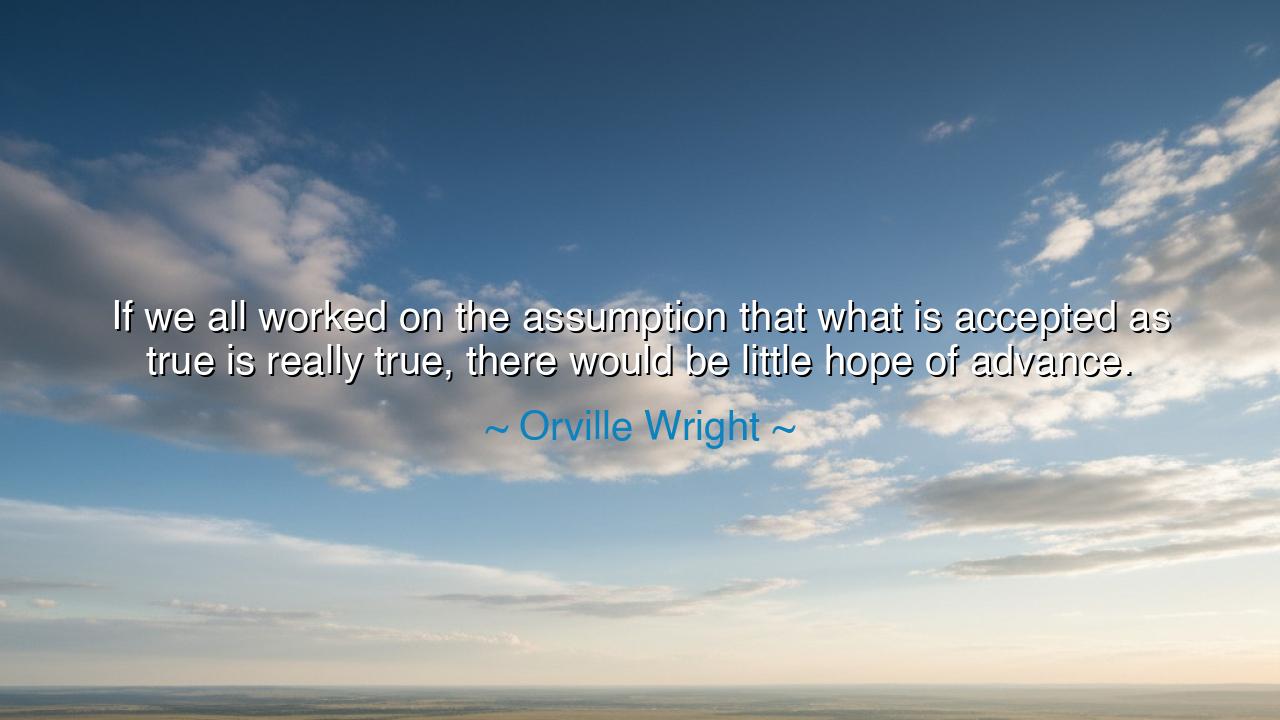
If we all worked on the assumption that what is accepted as true
If we all worked on the assumption that what is accepted as true is really true, there would be little hope of advance.






“If we all worked on the assumption that what is accepted as true is really true, there would be little hope of advance.” — Orville Wright
In these bold and luminous words, Orville Wright, one of the two brothers who first conquered the skies, reveals the eternal spirit of discovery — the courage to question what the world calls truth. When he says, “If we all worked on the assumption that what is accepted as true is really true,” he warns against the most subtle and dangerous prison of the human mind: the belief that knowledge is complete. For every age, every culture, has its accepted truths — boundaries drawn by fear, tradition, and authority. But progress, he teaches, belongs to those who look upon those boundaries and dare to ask, “What if they are wrong?”
To understand the power of this quote, we must remember the world into which Orville and Wilbur Wright were born. At the dawn of the twentieth century, the idea of human flight was dismissed as madness. Learned men of science declared it impossible. Newspapers mocked those who tried. The laws of physics, as they were then understood, forbade it. Yet the Wright brothers — two humble bicycle makers from Dayton, Ohio — refused to accept the world’s verdict. They questioned what “everyone knew” to be true. They studied the flight of birds, built their own wind tunnels, tested and failed, tested and failed again. And in December of 1903, they rose from the sands of Kitty Hawk and proved that truth itself can change.
The ancients, too, knew this truth — that the progress of humankind depends not on obedience to what is known, but on rebellion against it. Socrates questioned the wisdom of Athens and paid with his life, yet his questioning gave birth to philosophy. Galileo defied the accepted truth that the Earth was the center of the universe, and though he was silenced, his telescope widened the heavens. Every age has its sacred beliefs, and every age is renewed by those who dare to challenge them. Orville Wright’s words echo across time as a hymn to this sacred rebellion — the flame of curiosity that keeps humanity from sinking into the comfort of ignorance.
The phrase “little hope of advance” is not merely about technology, but about the progress of the soul. To “advance” means to grow — in knowledge, in morality, in spirit. When a people cease to question, they cease to grow. A society that worships its own truths becomes stagnant, fearful of change, and blind to possibility. The Wright brothers’ triumph was not simply mechanical; it was spiritual. They proved that truth is not a wall, but a horizon — ever receding, ever inviting. To advance, we must abandon the safety of certainty and walk boldly into the unknown.
There is a story told of a young apprentice who once asked his master, “What is truth?” The master led him to a river and placed a pebble in his hand. “This pebble is truth,” he said. “But do not hold it too tightly, for in your grip, you will crush it — and in your fear, you will stop seeking more.” So it is with human knowledge. The moment we believe our understanding is complete, we close the door to discovery. Orville Wright’s wisdom is a warning to every generation: truth must be pursued, not possessed.
And yet, his lesson is also one of hope. For to doubt the accepted is not to despair, but to dream. The Wright brothers’ journey began with doubt, but it was doubt driven by faith — faith that there was more to know, more to see, more to become. True advancement, then, requires both humility and courage: humility to admit that what we know is incomplete, and courage to step beyond it. Those who live by these twin virtues — question and curiosity — are the architects of the future.
Lesson:
From Orville Wright’s words, we learn that the progress of humankind depends on the bravery to challenge the limits of accepted truth. Do not fear to ask “why,” nor shrink from asking “what if.” The world advances because of the restless minds who refuse to be satisfied with yesterday’s answers. Let your mind be alive with wonder. Test what you are told, even by the wise. Seek truth not as a treasure to be hoarded, but as a horizon to be chased. For it is through this sacred restlessness — this refusal to settle for what is — that humanity rises, just as the Wright brothers rose from the ground and turned the dream of flight into the reality of the sky.






AAdministratorAdministrator
Welcome, honored guests. Please leave a comment, we will respond soon